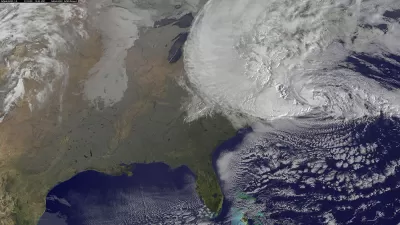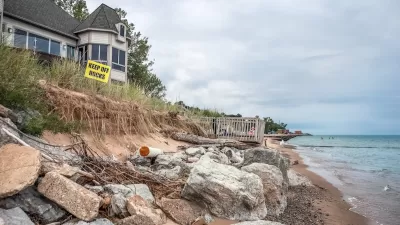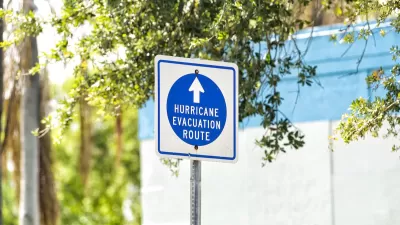The agency has created an economic incentive for cities, states and counties to deal with environmental threats.

In a new report, Moody’s Investor Services becomes the first of the three major credit-rating agencies to outline how the threat of climate will affect the bond ratings of a given city, county or state.
The company plans to take into account both the actual risk of the effects of climate change—floods, wildfires, rising sea levels, hurricanes—and whether or not appropriate measures have been taken to prepare for those risks.
At NPR, Nathan Rott quotes a Moody’s executive:
"'If you have a place that simply throws up its hands in the face of changes to climate trends, then we have to sort of evaluate it on an ongoing basis to see how that abdication of response actually translates to changes in its credit profile,' says Michael Wertz, a Moody's vice president."
Rott writes that in some places, like South Florida, a fair amount has been done to mitigate potential effects a changing climate, but that “it can be difficult for a policymaker to justify a big investment when the associated benefits or risks seem a long way down the road.”
Significantly, “Moody’s announcement may change that,” Rott writes, effectively created an immediate economic incentive to include climate change preparedness in city and state budgets.
FULL STORY: Credit Rating Agency Issues Warning On Climate Change To Cities

Maui's Vacation Rental Debate Turns Ugly
Verbal attacks, misinformation campaigns and fistfights plague a high-stakes debate to convert thousands of vacation rentals into long-term housing.

Planetizen Federal Action Tracker
A weekly monitor of how Trump’s orders and actions are impacting planners and planning in America.

In Urban Planning, AI Prompting Could be the New Design Thinking
Creativity has long been key to great urban design. What if we see AI as our new creative partner?

Pedestrian Deaths Drop, Remain Twice as High as in 2009
Fatalities declined by 4 percent in 2024, but the U.S. is still nowhere close to ‘Vision Zero.’

King County Supportive Housing Program Offers Hope for Unhoused Residents
The county is taking a ‘Housing First’ approach that prioritizes getting people into housing, then offering wraparound supportive services.

Researchers Use AI to Get Clearer Picture of US Housing
Analysts are using artificial intelligence to supercharge their research by allowing them to comb through data faster. Though these AI tools can be error prone, they save time and housing researchers are optimistic about the future.
Urban Design for Planners 1: Software Tools
This six-course series explores essential urban design concepts using open source software and equips planners with the tools they need to participate fully in the urban design process.
Planning for Universal Design
Learn the tools for implementing Universal Design in planning regulations.
planning NEXT
Appalachian Highlands Housing Partners
Mpact (founded as Rail~Volution)
City of Camden Redevelopment Agency
City of Astoria
City of Portland
City of Laramie





























